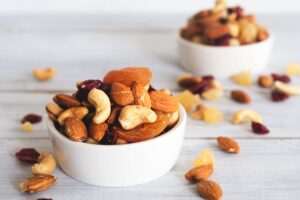The following is a list of the healthiest foods that you can get. This will help you get an idea as to what foods are the best for your body.
When it comes to maintaining good health, diet plays a crucial role. Eating a balanced diet that includes a variety of nutrient-rich foods is essential for optimal health and well-being. In this article, we will introduce you to ten of the healthiest foods you can add to your diet to improve your health.
1. Spinach

Spinach is a leafy green vegetable that is packed with essential nutrients, including vitamins A, C, and K, as well as minerals like iron, calcium, and magnesium, making it an ideal food for a balanced diet. It’s low in calories and high in fiber, making it an excellent food for weight loss. You can enjoy spinach raw in salads, sautéed as a side dish, or blended into smoothies.
What’s more, spinach is low in calories and high in fiber, making it an excellent food choice for those trying to lose weight or maintain a healthy weight. The high fiber content of spinach helps to promote feelings of fullness, reducing the likelihood of overeating or snacking on unhealthy foods.
There are many delicious ways to enjoy spinach, including raw in salads, sautéed as a side dish, or blended into smoothies. You can also add spinach to your soups, stews, and casseroles for an extra nutrient boost. Whether you’re a fan of leafy greens or looking to incorporate more nutrient-rich foods into your diet, spinach is a tasty and healthy addition that is easy to prepare and enjoy.
2. Blueberries
Blueberries are a delicious superfood that is high in antioxidants, fiber, and vitamins, making them an ideal choice for a balanced diet. They are known to improve brain function, promote heart health, and prevent chronic diseases like cancer. Add them to your morning cereal, oatmeal, or yogurt, or enjoy them as a healthy snack.
In addition to antioxidants, blueberries are also high in fiber, which is essential for digestive health. Eating fiber-rich foods like blueberries can help to regulate bowel movements, reduce constipation, and promote feelings of fullness.
Blueberries are also great for heart health. They are rich in nutrients like potassium, folate, and vitamin C, all of which are essential for maintaining good heart health. Eating blueberries regularly may help to lower blood pressure, reduce the risk of heart disease, and improve overall cardiovascular health.
Adding blueberries to your diet is easy and delicious. You can add them to your morning cereal, oatmeal, or yogurt for a healthy and nutritious breakfast. Alternatively, you can enjoy them as a healthy snack on their own or add them to smoothies and baked goods for a boost of flavor and nutrition.
3. Salmon

Salmon is a fatty fish that is an excellent source of omega-3 fatty acids, which are vital for heart health, making it an ideal choice for a balanced diet. It’s also a good source of protein and vitamin D. Eating salmon twice a week can reduce your risk of heart disease and stroke.
There are many ways to prepare salmon, making it a versatile ingredient in the kitchen. You can grill it, bake it, or pan-sear it for a crispy texture. It’s also delicious when paired with fresh herbs, lemon juice, or a creamy sauce.
If you’re looking to improve your heart health, adding salmon to your diet is an easy and delicious way to do so. So why not try incorporating this tasty fish into your meals and reap the benefits of its many health-promoting nutrients?
4. Quinoa
Quinoa is an ancient grain that originated in the Andean region of South America. Quinoa is a gluten-free grain that is rich in protein, fiber, and minerals like magnesium, potassium, and iron, making it an excellent addition to a balanced diet. It’s a perfect alternative to rice or pasta and can be used in salads, soups, or as a side dish.
Quinoa is also high in fiber, which helps to regulate digestion and keep you feeling full for longer. It’s also a rich source of minerals like magnesium, potassium, and iron, which are essential for maintaining good health. Magnesium, for example, helps to regulate blood pressure and blood sugar levels, while potassium is necessary for heart health.
5. Avocado

Avocado is a delicious and creamy fruit that is packed with nutrients, making it a popular choice for health-conscious individuals. Avocado is a nutrient-dense fruit that is high in healthy fats, fiber, and potassium, making it a great choice for a balanced diet. It’s also an excellent source of vitamins C, E, and K. Add avocado to your salads, sandwiches, or smoothies for a healthy boost.
Avocado is also high in fiber, which is essential for digestive health. Eating fiber-rich foods like avocado can help to regulate bowel movements, reduce constipation, and promote feelings of fullness.
Furthermore, avocado is rich in vitamins C, E, and K, which are all vital for maintaining good health. Vitamin C is an antioxidant that can help to boost the immune system, while vitamin E helps to protect the body against damage from free radicals. Vitamin K is necessary for blood clotting and bone health.
Adding avocado to your diet is simple You can add it to your salads, sandwiches, or smoothies for a healthy boost. One of the most popular ways to enjoy avocado is as guacamole, which is a tasty and healthy dip made from mashed avocado, lime juice, and seasonings.
6. Broccoli
Broccoli is a versatile and delicious cruciferous vegetable that is packed with nutrients, making it a great addition to any healthy diet. Broccoli is a cruciferous vegetable that is loaded with nutrients like vitamins C, K, and A, and minerals like calcium, potassium, and iron, making it an excellent choice for a balanced diet. It’s also high in fiber and antioxidants, making it an ideal food for weight loss and preventing cancer.
Moreover, broccoli is high in fiber, which is essential for digestive health. Eating fiber-rich foods like broccoli can help to regulate bowel movements, reduce constipation, and promote feelings of fullness. Additionally, fiber is beneficial for weight loss since it can help to reduce overall calorie intake and increase feelings of satiety.
Studies have shown that consuming cruciferous vegetables like broccoli may also help to reduce the risk of cancer. Broccoli contains a compound called sulforaphane, which has been shown to have anti-cancer properties. Sulforaphane may help to reduce the growth of cancer cells and prevent the formation of tumors.
Broccoli will add deliciousness to your diet. You can steam it, roast it, or stir-fry it for a healthy and nutritious side dish. Alternatively, you can add it to soups, salads, or casseroles for an extra boost of nutrients and flavor. With its impressive nutrient profile and health benefits, broccoli is undoubtedly a superfood that you don’t want to miss out on!
7. Almonds

Almonds are a tasty and nutritious snack that is rich in protein, fiber, healthy fats, and minerals such as magnesium and vitamin E, making them an excellent addition to a balanced diet. Eating a handful of almonds a day can help lower cholesterol levels and reduce the risk of heart disease. Protein is essential for building and repairing tissues, supporting immune function, and maintaining healthy skin, hair, and nails.
Another essential nutrient found in almonds is vitamin E, which is a powerful antioxidant. Antioxidants are essential for protecting the body against damage from free radicals, which can cause oxidative stress and lead to chronic diseases like cancer and heart disease. Eating foods that are high in antioxidants, like almonds, can help to prevent the onset of these diseases.
Incorporating almonds into your diet is easy and delicious. You can enjoy them as a snack, or add them to salads, smoothies, or oatmeal for an extra boost of nutrients and flavor. Eating just a handful of almonds a day can provide you with a wealth of health benefits and may help to improve your overall well-being.
8. Sweet Potatoes
Sweet potatoes are a delicious and nutritious addition to any diet. Sweet potatoes are a nutrient-dense root vegetable that is high in fiber, vitamins, and minerals, making them an excellent choice for a balanced diet. They are an excellent source of beta-carotene, which is essential for eye health. Add sweet potatoes to your diet by roasting, baking, or mashing them
Sweet potatoes are also rich in vitamin C, potassium, and other antioxidants. These nutrients help to support overall health and can even reduce the risk of chronic diseases like cancer and heart disease.
There are many ways to enjoy sweet potatoes, making them a versatile ingredient in the kitchen. You can roast them for a crispy texture, bake them for a soft and sweet taste, or mash them for a creamy side dish. Sweet potatoes are also a great addition to soups, stews, and casseroles, adding a natural sweetness to any recipe.
Incorporating sweet potatoes into your diet is an easy way to increase your intake of vitamins, minerals, and fiber. So why not give them a try and see how they can benefit your health and taste buds?
9. Greek Yogurt
Greek yogurt is a delicious and healthy dairy product that is loaded with protein, calcium, and probiotics, which are good for gut health, making it a great choice for a balanced diet. Enjoy it as a breakfast option, or snack, or use it as a healthy substitute for sour cream.
Greek yogurt is also high in probiotics, which are beneficial bacteria that can improve gut health. Probiotics help to maintain a healthy balance of bacteria in the gut, which is essential for proper digestion, immune function, and overall health. Consuming probiotic-rich foods like Greek yogurt may also help to reduce the risk of certain digestive disorders, such as irritable bowel syndrome and inflammatory bowel disease.
Incorporating Greek yogurt into your diet makes an easy and delicious meal. You can enjoy it on its own, add it to smoothies, and oatmeal, or use it as a topping for fresh fruit. With its many health benefits and versatility, Greek yogurt is a fantastic addition to any healthy diet.
10. Olive Oil

Olive oil is a staple in many Mediterranean diets and is renowned for its numerous health benefits. Olive oil is a healthy fat that is high in monounsaturated fatty acids, which are good for heart health, making it a great choice for a balanced diet. It’s also a good source of vitamin E and antioxidants. Use olive oil as a healthy substitute for butter or margarine in cooking.
Olive oil is also rich in polyphenols, another type of antioxidant that has been shown to have anti-inflammatory and anti-cancer properties. Polyphenols are particularly abundant in extra-virgin olive oil, which is the least processed form of olive oil and has the highest nutritional value.
Using olive oil as a substitute for butter or margarine in cooking is an excellent way to reap its many health benefits. Olive oil has a mild, fruity flavor that can complement a wide range of dishes, from roasted vegetables to grilled meats.
You can drizzle it over salads, use it to sauté vegetables, or simply dip your bread in it. With its numerous health benefits and versatile culinary uses, olive oil is a must-have ingredient in any healthy kitchen.
In summary, including these top ten healthy foods in your diet can provide numerous health benefits, from improving heart health to reducing the risk of chronic diseases. Incorporate these foods into your daily meals and snacks to achieve optimal health and well-being.

